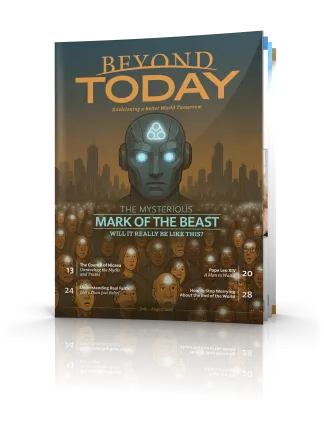Follow Me: The Spiritual Glow of Joy

Faithful people of God, Jesus Christ above all, set us an example in weathering the storms of life and persevering through a quality that illuminated their life toward God’s purposes.
Nearly 3,000 years ago a person referred to in Scripture as a man after God’s own heart (see 1 Samuel 13:14; Acts 13:22) cried out to the Lord after he was confronted over his terrible sin in the matter of Bathsheba and Uriah. His former fountain of hope had come to a standstill. The well of that same heart that once faced Goliath had run dry. He earnestly pleaded:
“Create in me a clean heart, O God, and renew a steadfast spirit within me. Do not cast me away from Your presence, and do not take your Holy Spirit from me. Restore to me the joy of your salvation, and uphold me by your generous Spirit” (Psalm 51:10-12, emphasis added throughout).
What was King David requesting in terms of this joy of salvation?
Hebrews 12:2 later declared the focus of Jesus Christ through His terrible suffering: “. . . who for the joy that was set before Him endured the cross, despising [or disregarding] the shame, and has sat down at the right hand of the throne of God.” Humanly, “cross-filled joy” sounds like an oxymoron if ever there was one!
The same joy is to be ours. As the returning lord in parable, who represents Christ, proclaims to His faithful servants, “Enter into the joy of your lord” (Matthew 25:21-23).
In reading these passages, it’s incumbent on us to understand just what joy is. Is it only a future destination, or is it also a means of traveling, day by day and heartbeat by heartbeat, towards the Kingdom of God? Understanding how Scripture defines joy and realizing what it truly portrays are essential for disciples of Jesus Christ to understand, embrace and internalize that we might fully heed His call of “Follow Me” (see John 21:19).
The difference between enjoyment and joy
For starters, we need to understand the difference between enjoyment and joy. Enjoyment is based on external pleasant things coming our way that plant a smile on our face, make us laugh, maybe even jump up and down. Should Christians experience enjoyment? Absolutely! However, let’s go deeper.
Joy is something planted in us by God’s Spirit that creates a knowing smile on our hearts and stays there even when immediate tidings or long-term scenarios are humanly challenging. It is experiencing the beating pulse of God’s Spirit residing in you.
The spiritual glow of joy is generated not by impactful exterior stimuli, but radiates from the inside out, burning so brightly that neither man nor Satan can take it away unless we allow them. It is more than a nightlight left on in the dark. It is the spiritually illuminating 24/7 presence of God’s indwelling Spirit—the same by which He brought light amidst darkness in Genesis 1.
So how does that knowing smile on our hearts grow, stay put and mature as we heed Jesus’ invitation of “Follow Me”? In all of this we need to remember that our Heavenly Father through Christ is calling us to relationship—with Him as our God and we as His people (2 Corinthians 6:16). God does His part in that, as only He can, but we also have a role. That’s why it’s called a relationship! God grants us the “gift of the Holy Spirit” (Acts 2:38), seeding us with joy that ultimately bears fruit (see Galatians 5:22). As we all know fruit from a cultivated tree does not come to fruition overnight. It needs light, water, nutritive soil and fertilizer supervised by an attentive caretaker. It must bear up with all the variable elements of each season of the year.
When God tells us to “walk in the Spirit” (Galatians 5:16), that means we will need to get up and move forward with Him, experiencing the pressure points of what stresses us in our humanity—all the while recognizing that we do not walk alone! That, my friends, is what widens the smile in our hearts, which cannot be robbed from us because it is sealed by the Spirit of God (see 2 Corinthians 1:21-22).
Let us remind ourselves of Jesus’ initial calling card in Luke 14 to the “great multitudes” accompanying Him (verse 25). He told them: “. . . Whoever does not bear his cross [his own life burden] and come after Me cannot be My disciple” (verse 27). The metaphor is clearly speaking of the weightiness of crucifixion that the immediate audience knew so well. Let us ask ourselves: Is this any way to start a movement? Humanly, no! Divinely, yes! Bottom line: Before you bear a crown, you will bear a cross—in some ways of your own making and in some ways by others. Here, Jesus is so incredibly honest in His messaging. He never said it would be easy. But He did say that it would be worth it—for the joy set before Him and all of us, as highlighted in Hebrews 12:1-2.
Sharing joy and persevering
Returning to King David’s plea in Psalm 51, consider how his request to have the joy of salvation restored to him was not merely self-focused but intended to radiate outward to others. Let’s finish the story, his story, our story together, in the next verse: “Then I will teach transgressors Your ways, and sinners shall be converted to You” (verse 13). His heart and thoughts moved beyond himself. He envisioned how his story in God’s hands might positively impact others not by what he would merely say, but what he could express by existing in an ongoing state of surrender and molding in the hands of the living God. And that impact has continued to you and me.
In whatever we go through, we should always focus on the ultimate purpose God is working toward. The opening of the epistle of James can be a bit surprising: “My brethren, count it all joy when you fall into various trials [Huh? Really?], knowing that the testing of your faith produces patience. But let patience have its perfect work, that you may be perfect and complete, lacking nothing” (verses 2-4).
How does that work in real time, our time, when the spiritual glow of the smile on our heart, which has withstood so many exterior jabs, begins to dim?
Philippians 4:4-8 gives us the prescription, as it systematically supplies the spiritual cure:
“Rejoice [joy on steroids!] in the Lord always [not ourselves—how is that working?]. Again I will say, rejoice! [just in case you missed it the first time!] . . . Be anxious for nothing [what is still on our man-made list?], but in everything by prayer and supplication [talking to God and not ourselves], with thanksgiving, let your requests be made known to God; and the peace [‘shalom’] of God, which surpasses all understanding [better than the facts as they appear on the ground], will guard your hearts and minds through Christ Jesus.”
When a Jew offers a “Hebraic aloha” of hello and goodbye in saying “Shalom,” something special is being shared. The essence is not that God would grant you a trouble-free existence, but rather that He supply you the wherewithal to master what lies before you. Psalm 23 says that with the Lord as our Shepherd our needs will be met (verse 1). We still go through the valley of shadow, yet with God’s presence and help (verse 4).
The ultimate key to joy
The epistle of James concludes where it began in chapter 1 on enduring trials, stating, “You have heard of the perseverance of Job and seen the end intended by the Lord—that the Lord is very compassionate and merciful” (James 5:11).
What was the key to Job maintaining the spiritual glow of joy as he suffered terrible pain and the loss of so much in his physical life? We see it in Job 19:25, as he declares, “For I know that my Redeemer lives, and He shall stand at last on the earth.” Job’s key is ours too. The storms of life will most assuredly come our way, pressing to erode the embedded inward smile on our hearts manifested by God’s grace. We endure through active faith in our Redeemer’s promise, “Lo, I am with you always, even to the end of the age” (Mathew 28:20).
As we part until next time, let us remember the rhythmic revelation of Psalm 30:4-5: “Sing praise to the Lord, you saints of His, and give thanks at the remembrance of His holy name. For His anger is but for a moment, His favor is for life; weeping may endure for a night, but joy comes in the morning.”







